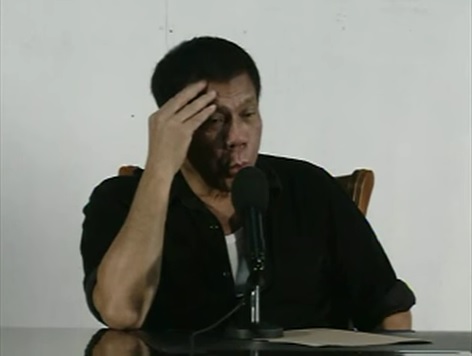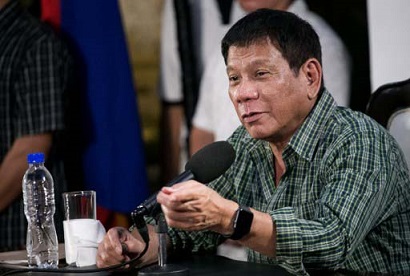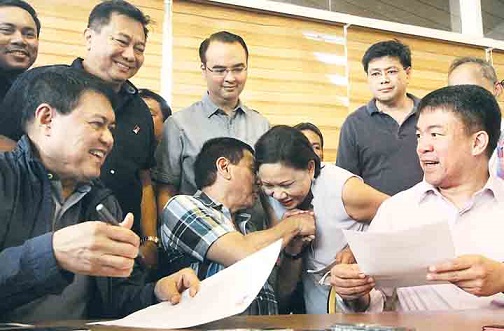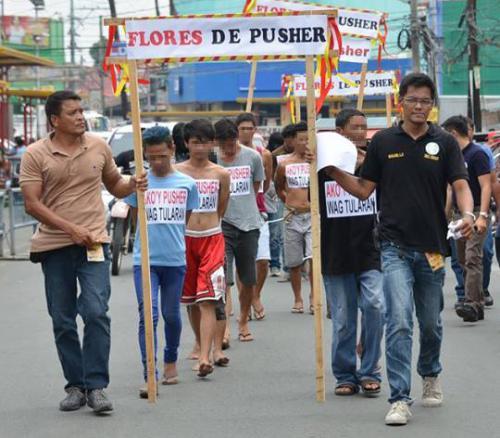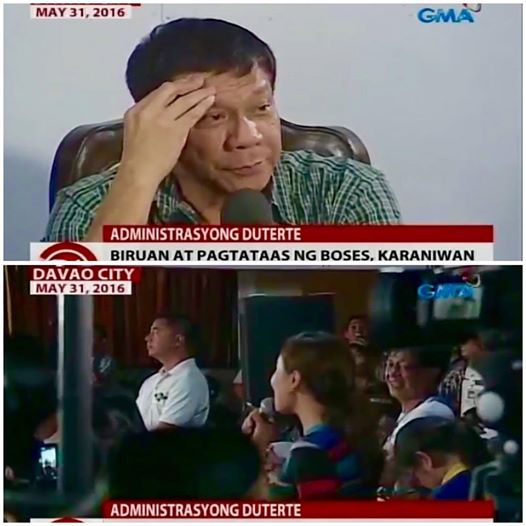
President -elect Rodrigo Duterte May 29 presscon. Lower photo shows GMA7′s Mariz Umali asking a question.
A reporter’s persistence is not for persistence’s sake. It is not caprice.
A reporter pursues a subject to clarify so that he or she can give the public the information correctly and clearly. Reporters always ask for categorical answers to avoid misinterpretation. Because it is the duty of the journalist to make sure that his or her reports are accurate- a basic in journalism.
Reporters covering President-elect Rodrigo Duterte have been criticized for being soft on him. Some, yes. Even fawning. But not all.
Watching his late night to mid-morning press conferences that are one or two hour monologues, I sympathize with reporters covering him. One needs not only an ample reserve of stamina but nerves of steel not to get intimidated by his manners which border rudeness.
Take the case of GMA-7 Mariz Umali, the subject of the president-elect’s wolf-whistling.
She had to raise her voice to ask her question, “How do you deal with cabinet secretaries who are not performing?” to get Duterte’s attention because no one was moderating the presscon. It was a free-for-all format.
Even when Duterte made that improper act and even said “Nagpapansin ka talaga, ano (You really want to be noticed.)” to the amusement of other people in the room, Umali remained focused and repeated her question until Duterte answered.
Same thing with Rappler’s Pia Ranada Robles, the subject of vicious posts in social media for her persistence in asking Duterte about the impropriety of his wolf-whistling considering that a Davao ordinance considers it a form of sexual harassment.
Here’s the transcript showing how Ranada-Robles stood her ground amid Duterte’s attempt to avoid the issue. (Note: Except for the last quote of Duterte, the transcript was by Rappler’s Paterno Esmaquel II)
Pia: Sir, we have this ordinance nga, the Women Development Code. In the ordinance, it states that catcalling, whistling – sorry, let me just read it, part of it: “Cursing, whistling, or calling a woman in public with words having dirty connotations or implications” is actually sexual harassment, so it seems as if you, uh—”
Duterte: (whistles)
Audience: (a few people laugh)
Duterte: You know, you don’t have any business stopping me. That is freedom of expression.Pia: Sir, your own law says that there is a limit to expression.
Duterte: If you go overboard and you start to harass the woman.
Pia: Sir, the definition in the ordinance is “whistling,” so that’s already—
Duterte: Well, if you go, you cajole with the woman (whistles). “Miss, uh…” As a matter of fact, when I first saw you, I said… (whistles)Audience: (silence)
Duterte: Go to another question. You cannot stop anybody from whistling.
Pia: Okay, Sir.
Duterte: But I would say, who gave you the right to presume that I was whistling because I saw you? You have to be in a room, kaisa ka lang, a man and you, and he would whistle (whistles).
Pia: So, Sir, you’re saying you were not whistling at Mariz during the time she asked her question?
Duterte: Of course not. That is, ano, objective, or is it subjective? Subjective?
Pia: No, Sir, because she was asking.
Duterte: You are guessing.
Pia: No, no, no, Sir. I’m not guessing. Because she was asking a question, and the question was directed at you, and your reply to her was a whistle. So unless you clarified that you were talking to someone else–
Duterte: I was exasperated by the question. Whistling is not a sexual thing (whistles again, then mumbles)…Wala nang hinto kundi magtanong.
Pia: Sir, for you it might not be sexual, but to others it might be. So the world does not revolve around your definition.
Duterte:Do not presume that you are the one. It belongs to the (intelligible). I would look at that woman there.
Like in any other profession, journalism has its own bad eggs, but many continue to adhere to the tenets of journalism which are to empower the people with information, give voice to the voiceless and hold those in power accountable.
It’s good to see the idealism and fire among the young journalists.
A tyrant won’t have it easy.
Transcript of the June 2 press conference. For Rana-Robles questions, start at 49:32:
